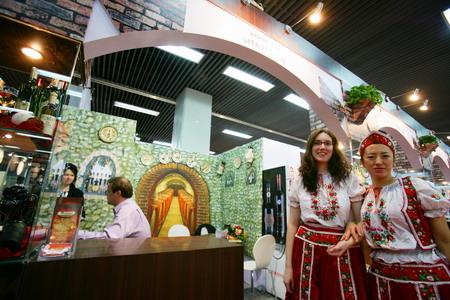
Salespeople wearing traditional Hungarian clothes promote Hungarian products at an exhibition in Beijing in this file photo. [Photo / China Daily]
BUDAPEST, Hungary - After announcing the purchase of Hungarian bonds at the start of his visit to Europe, Premier Wen Jiabao on Saturday further assured nations in Central and Eastern Europe about Beijing's commitment to support their efforts to beat the debt crisis.
"China is a responsible long-term investor in the European financial market. We support the economic and financial adjustment measures adopted by Central and Eastern European countries and have confidence in their financial markets in the future," Wen said while addressing a forum to encourage business ties between China and the region at the Hungarian Academy of Sciences.
The premier announced earlier on Saturday, after meeting his Hungarian counterpart, Viktor Orban, that China will consider buying a "certain amount" of Hungarian bonds and continue supporting Europe and the euro.
Hungary has been severely hit by the financial crisis and economic recession since 2008 and has a high fiscal deficit and public debt ratio.
Beijing had earlier extended a helping hand to several European counties - including Greece, Spain and Portugal - by purchasing bonds.
"We are willing to explore all kinds of effective ways of cooperation and will continue to support the development of Central and Eastern European countries," Wen said.
He listed reasons behind his confidence, citing rich natural resources, solid economic foundations and strength in technology and education in the region as positives.
Wen's visit to Hungary was the first by a Chinese premier for 24 years.
The forum held in Hungary, the largest exporter to China in Central and Eastern Europe, attracted not only businesspeople but high-ranking officials and diplomats from many countries in the region.
Nations in Central and Eastern Europe, many former members of the Soviet Union, have long maintained good relations with China. Most established diplomatic ties with Beijing very soon after the founding of the People's Republic of China in 1949.
"During the past several decades, although the international situation and the domestic situations of both sides have undergone big changes, we have always enjoyed mutual respect, mutual trust, mutual understanding and mutual support," Wen said.
However, the premier said he believed China's current trade volume with the region to be limited, accounting for less than 10 percent of that with the European Union.
To resolve the problem, he offered plenty of advice and asked both sides to ink "some big landmark projects" in the area of infrastructure construction. He also said China would like to accelerate the creation of the Eurasia railway line to facilitate transportation.
Wen wrapped up his two-day visit to Hungary and arrived in the UK later on Saturday to continue his three-nation European visit that will also take him to Germany.
In an example of the kind of business links between China and Europe, Pan Weizhou, chairman of the board of Weisen Agriculture and Forestry Development Co Ltd, a Chinese company based in Jiangxi province, told China Daily his company plans to invest more than 100 million yuan ($15.4 million) on buying land in Serbia so it can plant trees.
"The region is very attractive to us for its rich forestry resources, while such deals are also in line with the global green drive," Pan said.
Zalan Bacs, deputy CEO of strategy with Hungarian Power Co Ltd, said his company has started cooperation with several Chinese energy enterprises, including the State Grid Corporation of China.
"I believe there are plenty of opportunities here in Hungary and also the region to cooperate with Chinese companies," he said. "And the capital flow and technology brought by China will benefit the region."





